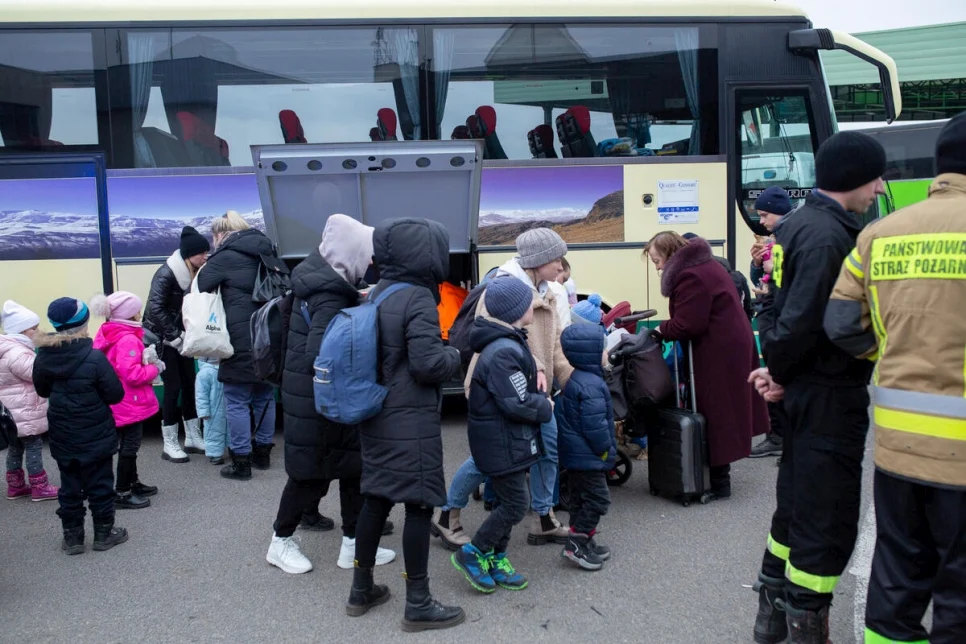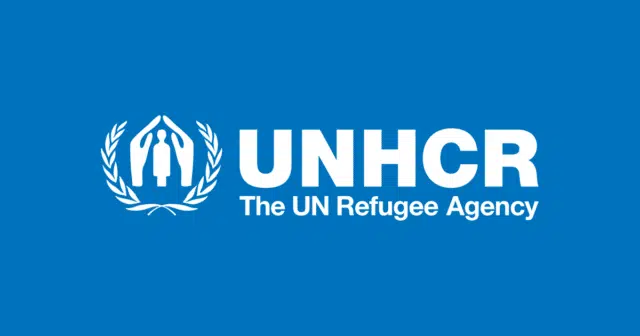
Refugees from Ukraine arrive in Poland at the Medyka border crossing. © UNHCR/Valerio Muscella
Joint statement by UNICEF Executive Director Catherine Russell and United Nations High Commissioner for Refugees Filippo Grandi
NEW YORK/GENEVA – In the past week, more than one million refugees have been forced to flee Ukraine seeking safety and protection. Hundreds of thousands of them are children. Amongst those fleeing, many are unaccompanied or have been separated from their parents or family members.
Children without parental care are at a heightened risk of violence, abuse and exploitation. When these children are moved across borders, the risks are multiplied. The risk of trafficking also soars in emergencies.
UNICEF and UNHCR urge all neighbouring and impacted countries to ensure the immediate identification and registration of unaccompanied and separated children fleeing from Ukraine, after allowing them access to their territory.
States should offer safe spaces for children and families immediately following border crossings, and link these to national child protection systems. The current emergency also necessitates rapidly expanding the capacity of emergency care arrangements with screened caregivers as well as other critical services for the protection of children, including against gender-based violence, as well as family tracing and reunification mechanisms.
For children who have been displaced across borders without their families, temporary foster or other community-based care through a government system offers critical protection. Adoption should not occur during or immediately after emergencies. Every effort should be made to reunify children with their families when possible, if such reunification is in their best interest.
Nearly 100,000 children, half of them with disabilities, live in institutional care and boarding schools in Ukraine. Many of these children have living relatives or legal guardians. We have received reports of institutions seeking to move children to safety in neighbouring countries or beyond. While recognizing that, under specific circumstances, humanitarian evacuations can be lifesaving and welcoming efforts to bring children to safety, it is critical that special measures be taken in the best interest of the children, and that the consent of their parents or persons responsible for their care be granted. Under no circumstances should families be separated as a result of relocation or evacuation movements.
Those legally responsible for children in institutions in Ukraine must ensure that evacuations are done in line with national authorities’ instructions. Movements must be reported to competent authorities in Ukraine and neighboring countries immediately upon crossing the border, and as far as possible, children should be evacuated with their identification papers and case files.
UNHCR and UNICEF are grateful for the solidarity and readiness shown by States to support unaccompanied and separated children through eventual relocation schemes. At the same time, it must be recalled that unaccompanied and separated children are particularly vulnerable and their immediate needs and safety where they are must be prioritized in the short term, while medium to long term solutions are identified, based on their best interests.
UNHCR and UNICEF are committed to working hand-in-hand to support national authorities to protect children, ensuring that their safety and protection are at the centre of the response.
About UNICEF
UNICEF works in some of the world’s toughest places, to reach the world’s most disadvantaged children. Across more than 190 countries and territories, we work for every child, everywhere, to build a better world for everyone.
About UNHCR:
UNHCR, the UN Refugee Agency, protects people forced to flee their homes because of conflict and persecution. We work in over 130 countries, protecting millions of people by responding with life-saving support, safeguarding fundamental human rights and helping them build a better future.
- For more information about UNHCR, visit www.unhcr.org/about-us.html
- Follow UNHCR on Twitter, Facebook, YouTube, Instagram, TikTok and LinkedIn
For further information, please contact:
- In New York, Najwa Mekki, UNICEF, nmekki@unicef.org, +917 209 1804
- In Geneva, Shabia Mantoo, UNHCR, mantoo@unhcr.org, +41 79 337 7650
- In Ottawa, Gisèle Nyembwe, nyembwe@unhcr.org, +1 613-986-4300
- In Montreal/Ottawa, Levon Sevunts, sevunts@unhcr.org, +1 438 881 4865




